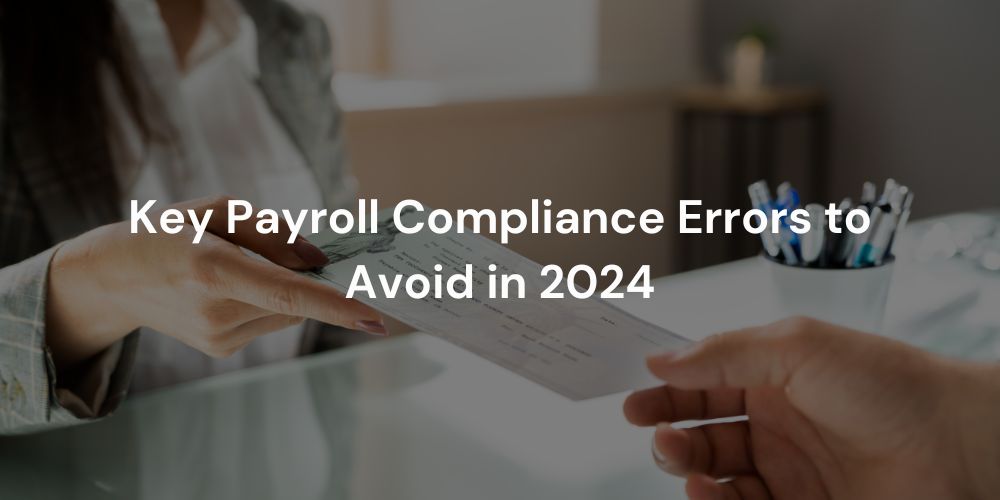Key Payroll Compliance Errors to Avoid in 2024


In today’s complex regulatory landscape, payroll compliance remains a critical aspect for businesses. Accurate payroll processing not only ensures employees are paid correctly and on time but also helps companies remain compliant with various tax laws, labor regulations, and other legal obligations. However, even with sophisticated payroll software and technology, errors can occur, leading to compliance issues that can have severe consequences. For payroll services companies like CPA Firms, avoiding these common mistakes is crucial to maintaining their clients’ trust and compliance integrity in 2024.
Introduction
Payroll services companies like CPA Firms play a pivotal role in managing payroll tasks for multiple clients, spanning diverse industries and geographical locations. They handle payroll processing, tax calculations, reporting, and ensuring adherence to numerous regulations. However, the complexity of regulations and frequent updates in laws and tax codes present challenges that can lead to costly mistakes if not addressed proactively.
Read more: 10 Key Considerations for CPA Firms Choosing a Payroll Partner
Top Common Payroll Compliance Mistakes
1. Misclassification of Workers
One of the most prevalent and consequential errors in payroll compliance involves the misclassification of workers. This mistake often arises when distinguishing between employees and independent contractors.
The distinction between employees and independent contractors holds substantial legal significance. Employees typically work under the direct control and supervision of the employer, while independent contractors generally have more autonomy in their work. However, due to the complexity of this distinction and the varying nature of work arrangements, misclassification can inadvertently occur.
The consequences of misclassification are multifaceted. Employees are entitled to various protections and benefits, such as minimum wage, overtime pay, workers’ compensation, and unemployment insurance, whereas independent contractors typically do not receive these benefits. Misclassifying workers can lead to legal disputes, penalties, and financial repercussions for businesses.
In the evolving landscape of employment models in 2024, characterized by the increasing prevalence of the gig economy and remote work, accurately classifying workers has become more complex yet crucial. Adhering to IRS guidelines and state regulations regarding worker classification is essential to avoid potential legal liabilities and ensure compliance in payroll management.
2. Inaccurate Record Keeping
Maintaining precise and up-to-date records stands as a cornerstone of payroll compliance. Errors in timekeeping, attendance, or leave accruals can result in incorrect payments, violating Fair Labor Standards Act (FLSA) regulations, and leading to compliance issues. Despite technological advancements easing record-keeping processes, stringent vigilance remains necessary to ensure the accuracy of data. This includes meticulous tracking of employee work hours, leaves, and any other relevant information vital for payroll calculations.
In the landscape of 2024, with the workforce increasingly embracing hybrid and remote work setups, the importance of accurate record-keeping has surged, demanding robust systems that account for various work modalities.
3. Late or Incorrect Filings
The significance of punctual and error-free payroll tax filings and documentation cannot be overstated. Ensuring that payroll taxes are filed in a timely manner and that all necessary documentation is accurate is pivotal. Late submissions or inaccuracies in tax filings not only incur penalties but also attract interest charges, further complicating the financial aspect for businesses. The constantly evolving tax landscape, marked by frequent adjustments in laws and regulations, underscores the importance of staying abreast of these changes. Remaining updated and submitting precise filings aligns with compliance standards in 2024, safeguarding businesses against penalties and ensuring financial prudence.
4. Non-compliance with Local Tax Regulations
The intricate network of diverse tax rates, laws, and regulations across different states and localities demands meticulous attention to detail. Failure to adhere to these regional nuances can result in severe penalties for businesses. The prevailing trend of remote work gaining prominence in 2024 intensifies this challenge for payroll service providers. It becomes imperative for these entities to adopt robust mechanisms that accurately account for employees’ varying locations. By doing so, payroll service providers can ensure adherence to local tax laws, thereby mitigating the risks associated with non-compliance and preserving the financial integrity of businesses.
5. Ignoring Legislative Changes
The dynamic nature of employment laws, tax codes, and regulations necessitates an unwavering commitment to ongoing monitoring and adaptation. Neglecting to incorporate these legislative changes into payroll systems and processes can lead to substantial non-compliance issues. In the landscape of 2024, characterized by swift and frequent changes in regulatory frameworks, staying well-informed about legislative updates is imperative for businesses. Promptly implementing necessary changes in payroll systems ensures alignment with the latest legal requirements, enabling businesses to navigate the regulatory landscape smoothly and maintain robust compliance standards.
6. Security Breaches and Data Protection
The escalating threat landscape of cyberattacks underscores the criticality of safeguarding sensitive payroll data. A breach in security not only jeopardizes confidential employee information but also exposes businesses to regulatory non-compliance repercussions. In the current climate of 2024, characterized by increasingly sophisticated cyber threats, payroll service companies are mandated to allocate resources toward robust cybersecurity measures.
Investing in state-of-the-art technologies and adopting stringent protocols for data encryption, access control, and threat monitoring is imperative. Moreover, ensuring compliance with stringent data protection laws such as the General Data Protection Regulation (GDPR) or the California Consumer Privacy Act (CCPA) is non-negotiable. Adherence to these regulations is contingent on the jurisdiction in which the business operates, necessitating meticulous compliance efforts to avert data breaches and associated legal liabilities.
7. Manual Errors in Calculations
Despite the integration of automation in payroll processes, the persistence of manual errors in calculations remains a concern. These errors can have far-reaching consequences, resulting in incorrect payments, dissatisfied employees, and compliance issues for businesses. As businesses navigate the landscape of 2024, the adoption of advanced payroll software emerges as a pivotal strategy to curtail such errors. These software solutions often feature advanced algorithms and built-in validation checks that minimize the likelihood of computational mistakes. Additionally, conducting regular audits of payroll data serves as a proactive measure to identify and rectify any discrepancies, thereby mitigating errors and ensuring accurate payroll disbursements.
8. Failure to Provide Accurate Employee Information
Inaccurate or incomplete employee information poses significant challenges during tax filings and audits, potentially leading to compliance issues for businesses. Regular verification and updates of employee details emerge as indispensable practices for maintaining compliance in payroll operations. In the evolving landscape of 2024, the accuracy of personal information, tax withholding forms, and direct deposit details assume heightened importance for seamless payroll processing.
Employers must institute robust mechanisms for updating and validating employee data, ensuring alignment with regulatory requirements. By prioritizing meticulous attention to detail and accuracy in managing employee information, businesses can uphold compliance standards and facilitate smooth payroll operations.
Mitigating Payroll Compliance Risks
Mitigating payroll compliance risks is paramount for businesses to uphold legal standards, avoid penalties, and maintain operational efficiency. To achieve this, several proactive measures can be undertaken:
1. Comprehensive Training and Education
Investing in continuous training programs and educational initiatives for payroll personnel is crucial. Ensuring that staff are well-versed in the latest regulatory updates, compliance requirements, and best practices equips them to navigate complex payroll processes accurately. Regular training sessions help in fostering a culture of compliance within the organization.
2. Robust Automation and Integration
Implementing advanced payroll systems that automate calculations, tax deductions, and reporting processes is pivotal. Integration of payroll software with HR and accounting systems streamlines data flow, minimizes manual errors, and enhances accuracy in compliance-related tasks.
3. Ongoing Audits and Reviews
Conducting regular internal audits of payroll procedures aids in identifying potential discrepancies or errors. These audits offer insights into areas that necessitate improvement, enabling timely rectification of compliance issues before they escalate.
4. Collaboration with Compliance Experts
Establishing partnerships or seeking guidance from legal and compliance experts ensures that payroll operations align with evolving regulatory requirements. Their expertise helps in interpreting complex laws, minimizing risks, and staying ahead of compliance challenges.
5. Enhanced Data Security Measures
Given the rising cyber threats, prioritizing data security is imperative. Implementing robust cybersecurity protocols and adhering to data protection laws fortifies the safeguarding of sensitive payroll information, reducing the likelihood of breaches and associated compliance issues.
6. Real-time Monitoring of Regulatory Changes
Staying abreast of legislative updates and regulatory changes in real-time is essential. Establishing mechanisms to monitor and promptly incorporate these changes into payroll systems ensures ongoing compliance with the latest legal requirements.
7. Documentation and Record-keeping
Maintaining meticulous records and documentation is fundamental for compliance. Accurate record-keeping of employee details, tax filings, and relevant documentation facilitates seamless audits and regulatory compliance.
8. Regular External Reviews and Assessments
Periodic external assessments by independent auditors or compliance consultants offer an unbiased evaluation of payroll processes. These reviews identify potential gaps or non-compliance issues, enabling organizations to take corrective actions promptly.
By adopting a proactive approach encompassing training, technology utilization, rigorous auditing, expert collaboration, data security measures, and staying updated with regulatory changes, businesses can effectively mitigate payroll compliance risks. Prioritizing these strategies ensures smoother payroll operations, reduces legal liabilities, and enhances overall compliance adherence.
Read more: Top 10 Payroll Tips for Small Business Owners
Why CPA Firms Choose to Outsource Payroll To Bestarion?
Outsourcing your payroll tasks to Bestarion offers CPA firms a multitude of benefits, ensuring comprehensive services and robust protection for their business operations. With a high satisfaction rate among customers, nearly 99% attesting to Bestarion’s superior assistance in complying with payroll taxes and regulations compared to their previous providers, here’s why partnering with us is advantageous:
1. Quick and Error-free Payroll Processing
Bestarion guarantees swift and precise payroll processing, reducing the likelihood of errors. Our streamlined systems ensure accuracy while expediting the payroll cycle, ensuring employees are paid accurately and on time.
2. Automated Tax Calculations and Payments
Our sophisticated systems automatically calculate and deduct taxes, ensuring compliance with tax regulations. Tax payments are managed seamlessly, minimizing the burden on CPA firms and reducing the risk of miscalculations.
3. Comprehensive Reporting
We provide comprehensive quarterly and annual reporting, facilitating smoother tax filings and audits. Detailed reports aid CPA firms in efficiently managing and analyzing payroll data.
4. Unemployment Insurance Claims Administration
Bestarion offers support in managing unemployment insurance claims, assisting CPA firms in navigating this complex aspect of payroll administration.
6. Integrated Time-Tracking Capabilities
Bestarion’s integrated time-tracking features streamline the recording and management of employee work hours, ensuring accurate payroll calculations and compliance with labor regulations.
7. Compliance Monitoring Across All 50 States
We meticulously monitor compliance requirements across all 50 states, ensuring that CPA firms and their clients adhere to the specific payroll regulations in each state, minimizing the risk of non-compliance penalties.
Partnering with Bestarion for payroll outsourcing empowers CPA firms to focus on core competencies while entrusting payroll-related tasks to a reliable and efficient service provider. Our comprehensive suite of services, coupled with advanced technology and compliance expertise, ensures accuracy, efficiency, and compliance with regulatory requirements across the board.
Conclusion
In the dynamic regulatory environment of 2024, payroll compliance is a challenging yet critical aspect for payroll services companies. By avoiding common mistakes such as misclassification of workers, inaccurate record-keeping, late filings, and non-compliance with local tax regulations, these companies can maintain accuracy, efficiency, and legal adherence in their payroll operations. Embracing technology, continuous training, regular audits, and collaboration with compliance experts are pivotal in ensuring compliance and mitigating risks associated with payroll processing. Ultimately, a proactive approach coupled with robust systems and adherence to best practices will help payroll services companies navigate the complexities of compliance in 2024 and beyond.
Read more:
Bestarion Website Admin

